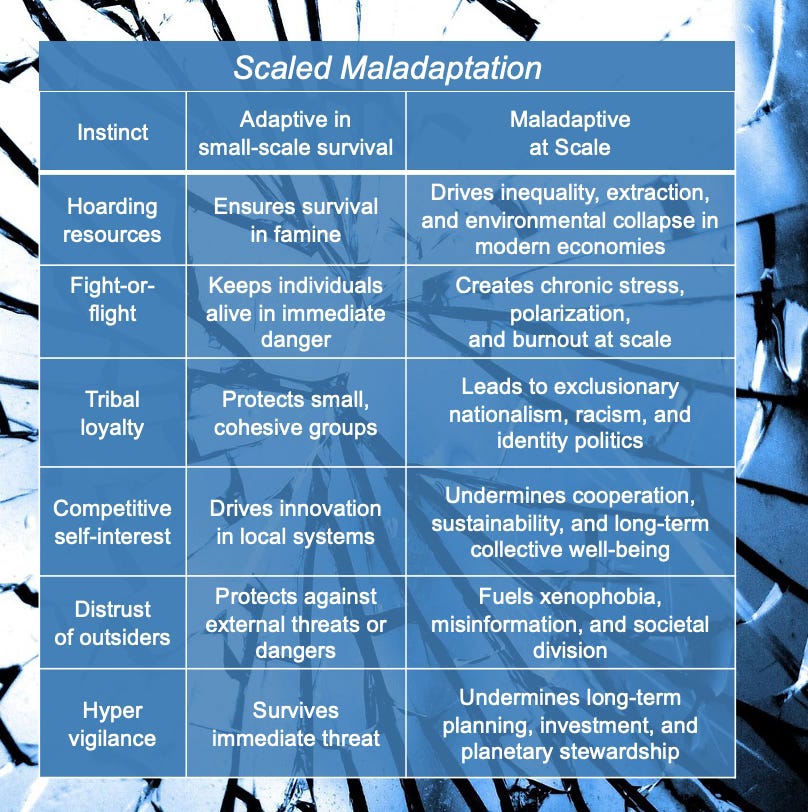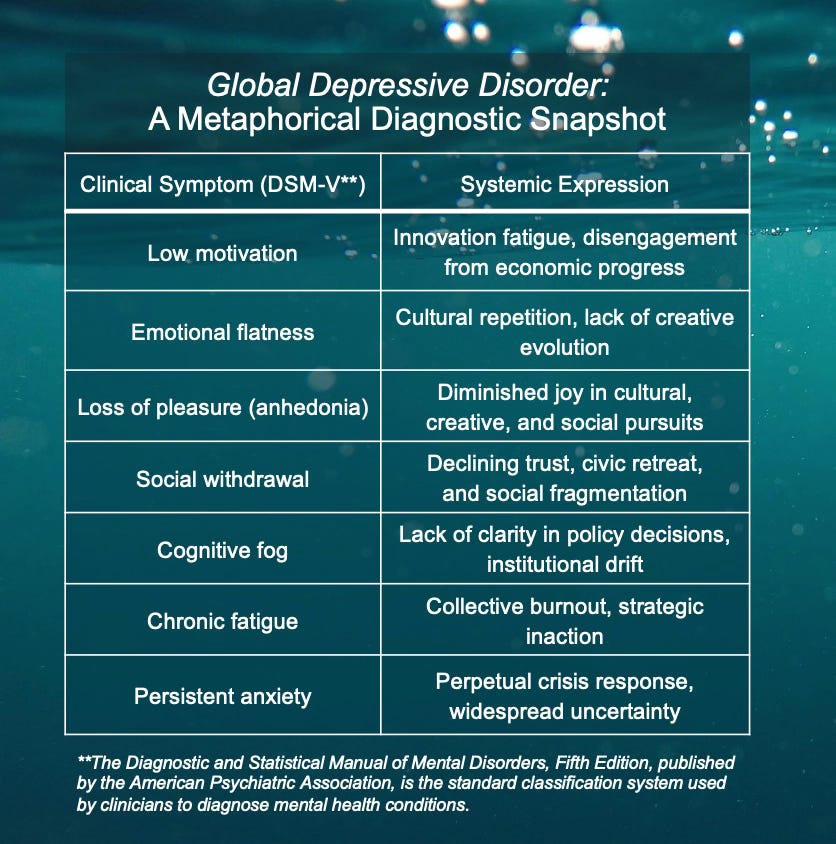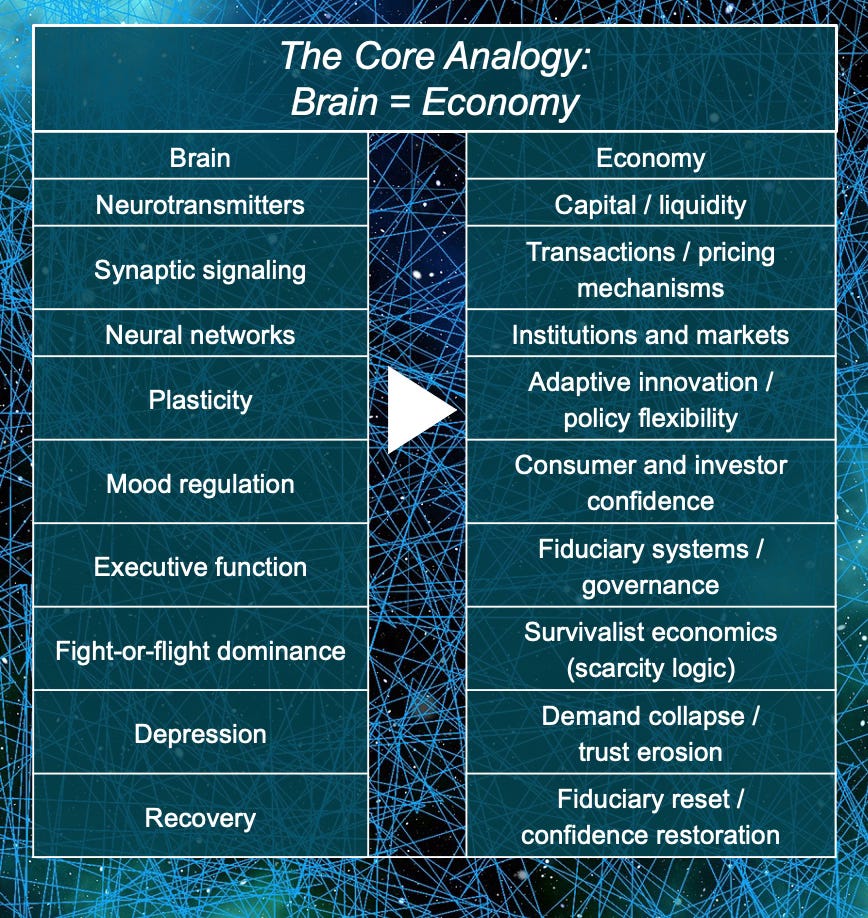You don’t have to be a scientist to recognize the patterns.
Livable habitat is exhausted.
Trust is exhausted.
Resources are exhausted.
Coping mechanisms are exhausted.
Stability is exhausted.
Our sense of outrage is exhausted.
Even outside war zones, poverty, or authoritarian regimes, many of us are running on empty. Chronic stress, insomnia, financial strain, information overload, and disempowerment fuel depression — even without genetic predisposition. Survivors of genocide and famine show how epigenetic trauma echoes across generations. Life is hard enough, but systemic failures — economic instability, political dysfunction, social fragmentation — amplify helplessness, overwhelm, and isolation.
In people, unrelenting distress rewires us: high cortisol locks us into vigilance, low serotonin normalizes anxiety, low oxytocin weakens connection. It changes behaviors, destabilizes societies, polarizes politics. Why not an entire species?
We are collectively, neurochemically, emotionally, generationally, and systemically spent. If we were to show up at the doctor’s office seeking help, our symptoms might include:
Flattened mood across generations and systems.
Loss of narrative, hope, vision, and agency.
Cultural numbness and emotional depletion.
Isolation, addiction, abuse.
These are the markers of Major Depressive Disorder (MDD), an actual clinical diagnosis. Scaled to the species, one could imagine these symptoms manifesting as:
Flattened collective mood (disengagement, numbness, apathy).
Loss of future orientation (hopelessness, disconnection, dread).
Withdrawal from meaning-making (cynicism, nihilism, learned helplessness).
Maladaptive attempts to self-regulate (distraction, consumption, conspiracy).
And in the broader context, as environmental and social breakdown worsen, these symptoms are both mirrored and magnified by:
Collective trauma (war, colonization, racialized violence).
Chronic insecurity (climate, housing, economic instability).
Systemic abuse (inequality, marginalization).
Breakdown of institutional trust and relational coherence.
These may not be clinical symptoms, but they are the ecosystem in which collective depression takes root — and they help explain why we feel so profoundly spent.
The underlying condition could be named the Global Depressive Disorder (GDD) – or, for non-clinicians, The Great Neo-Depression. The malaise is felt individually but shared collectively. It’s rooted in Exhaustivism, a brand-appropriate, late-stage, cannibalistic phase of neoliberalism. The flow of resources, financial logic, and survival mechanisms no longer protect us, as designed, but harm through maladaptation.
Like other byproducts of neoliberal progress, the true cost of making a society is not factored in order to maximize profits. In other words, if effluent is just the cost of production, exhaustion is just the cost of the status quo. Burnout isn’t a bug of neoliberalism. It’s an acceptable negative externality.
Naming what hurts
In Exhaustivism, economic extraction outpaces regeneration — across labor, ecosystems, democracy, and even hope. It takes until there's nothing left to take. This is the architecture behind The Great Neo-Depression, which is the emotional and existential aftermath of a system that demands more than people, or the planet can give.
Naming what hurts is the first disruption of the myth that insists we’re fine. For many, even existing within society requires a form of practiced confidence: the confidence to show up, to stay visible, to not collapse inward. Mental health therapy often begins here — not with optimization, but with permission to exist.
The inoculation against this Exhaustivism crisis lies in what we might call The Great Confidence Reset — a collective reclaiming of safety, agency, and emotional viability. It repurposes societal behaviors that have long been globally maladaptive.
For example, our hoarding instinct ensures an individual’s survival during famine, but at scale, it drives inequality, extraction, and collapse. Hyper-vigilance helps us in immediate danger, but institutionalized, it erodes long-term planning and planetary foresight.
The Great Neo-Depression “feels”
The Great Neo-Depression isn’t a clinical diagnosis, of course. It’s a framework: a kind of Rosetta Stone for decoding a civilization-wide response to trauma, uncertainty, and emotional depletion. Like Major Depressive Disorder scaled to society, it names the contradictions of systems that generate both growth and despair, productivity and paralysis. It shows how numbness becomes a survival strategy, how burnout is baked into the way we work, and how collapse is not accidental but engineered. It makes visible what the status quo obscures: the emotional cost of economic logic, the psychic toll of optimization, the quiet violence of precarity.
As much as it might feel like a personal failing, it’s a collective state. Depression, in this context, spreads like a social contagion — not viral, but endemic — as emotions and behaviors propagate through shared environments. Job and financial insecurity, information overload, and systemic instability foster disempowerment. When institutions fail to provide stability, trust erodes, and with it, motivation and engagement.
For those born into the neoliberal era — particularly Gen X and younger — the alignment between economic structure and psychological well-being was never a given. The “greed is good” ethos of the 1970s and ’80s normalized a system where precarity and mental strain are deeply entangled. For many, the dissonance isn’t a rupture — it’s a baseline, like being born with a degenerative condition. It’s not the result of poor choices, but of living within an architecture that grows less viable by the year.
The rise of eco-anxiety — 59% of young people “very” or “extremely” worried about climate collapse —is a stress response to a future inherited without guardrails, guidance, or grounding.
People with depression may not see a way out. At the systemic level, it’s the same: few signs point toward relief from this particularly bleak chapter of human history. We don’t escape the Great Neo-Depression by denying it. We meet it. We observe, update, and reframe it. Then, we integrate it into a system built for more than survival.
The “therapeutic” work builds systemic self-awareness of the possibility of alternative safer paths forward. Choice is powerful medicine.
The Great Depression parallels
In systems human and economic, depression almost always follows excess: A kind of historical bipolarism.
The Great Depression trailed behind the speculative mania of the Gilded Age and the reckless exuberance of the 1920s. The Great Neo-Depression we live in now is even more callous. It comes after decades of unchecked neoliberal expansion, where every form of capital is spent like it is infinite: ecological, emotional, financial, institutional.
The Great Depression (1929) was a material collapse.
Banks failed.
Jobs disappeared.
The system broke.
The Great Neo-Depression (2020s) is taking away the will to care.
Belief is failing.
Purpose disappears.
The system works exactly as designed — to deplete.
Now, entire categories of people — by race, gender, class, or identity — are being targeted and stripped from public protection. Health care guardrails are being dismantled. Climate safeguards gutted. It is neoliberal nihilism: the ideology laid bare, no longer pretending to care, no longer dressing up cruelty as efficiency.
Alternative medicine
The Great Depression ended through wartime mobilization and New Deal intervention — creating jobs, rebuilding infrastructure, and restoring belief in the future. A return to confidence.
This time, we won’t get another New Deal. Unlike Keynesianism, which absorbed global trauma by reinforcing collective security, neoliberalism has hollowed out the state’s capacity to protect. Today, the government is part of the dysfunction — and so we must look for remedies elsewhere in the system.
A therapy patient might be willing to try something unfamiliar — EMDR, Internal Family Systems, ketamine therapy, transcranial magnetic stimulation (TMS). A systemic reset requires similar openness: a willingness to “go there,” to follow the hard questions wherever they lead to answers we might not have considered, to explore unconventional but overlooked treatments with transformative potential.
Let’s call it Humanist Econotherapy — an insight-oriented approach for economic systems that centers on human well-being and future confidence as primary “sufficiency” goals. Its revelation lies in a repressed branch of law: fiduciary duty, and the power of pension plans to curate the future.
This is where unconventional answers live — waiting for us to ask the right questions.
Fiduciary duty is already a generic prescription — as ubiquitous as aspirin. Like any good medicine, it relieves the patient of having to figure everything out. Fiduciaries are already legally obligated by a kind of Hippocratic Oath to do better. And just as you don’t need to understand neuroscience to benefit from antidepressants, you don’t need to decode legal theory to trust that trust law is the right medicine, in the right dosage, for a dysregulated system.
Fiduciary money — pensions, endowments, foundations — was always meant to protect the future. But under Exhaustivism, even this “safe money” has been hijacked to fund depletion, speculation, and collapse. Today, tens of trillions in global retirement capital fuels deforestation, pollution, and instability — not because it must, but because it has abandoned its mandate to ensure stability, dignity, and care across generations.
Challenging that inverted logic — in courts, legislatures, and public discourse — can reroute one of the largest capital flows on Earth. It would be a regenerative reconfiguration of systemic plasticity.
The Great Confidence Reset
This is the work: Many no longer imagine a stable global society — one capable of enduring beyond its calcified negative core beliefs. However, in a desert of viable and reparative strategies, the fiduciary economy is a rare, actionable idea. It’s a side-door treatment.
And if there’s a global rallying cause left, it’s the climate crisis — one that demands collective focus, long-term thinking, and emotional resilience and leadership from an unconventional source. Fiduciaries carry a legal and ethical mandate to mobilize long-term well-being. In a world low on trust and stretched thin on imagination, this overlooked mechanism offers something rare: a lawful pathway to systemic care.
In psychotherapy, rather than “cure”, clinicians talk of recovery, remission, resolution, or integration — each signaling not perfection, but progress. These are the reasonable outcomes of Humanist Econotherapy: a confidence reset delivered not through force or revolution, but through fidelity.
We don’t need sweeping government overhauls or corporate salvation. Fiduciary duty already exists — global, embedded, and legally enforceable. It transcends borders and ideology. It is common sense encoded in law: loyalty, prudence, care.
A fiduciary challenge isn’t a grand ideological war — it’s a precise, legal act of economic repair. And, importantly, it doesn’t aim to save everyone. Saving everyone is a wonderful positive externality. Instead, it protects the few people with retirement protections and who were already promised dignity, security, and a future. Because of the vast money involved, it sets off the systemic ripple effects we need. It’s a possibility, and any good therapy starts with a belief in what’s possible. And a commitment to getting better.
Collapse requires nothing. It is gravity. We brace for it, narrate it, even normalize it.
Care, on the other hand, is not a mood or a virtue. It is a decision. In fiduciary terms, care is a legal obligation with measurable outcomes.
Administered at scale, fiduciary care doesn’t just reroute money — it reroutes consequence. It exposes the current systemic indifference not just unhealthy, but illegal.
So — what does it look like to begin?
Therapeutic models offer a guide for how. Cognitive therapies teach us to challenge harmful assumptions. Trauma-informed care shows the need for stability before transformation. Deprogramming works not by confrontation, but by creating space for alternative values to take root. Relational therapies rebuild trust through transparency and care.
In this case, the legal system offers one such intervention: challenging narrow interpretations of fiduciary law. It may sound off topic, but that’s what makes it an indirect, side-door strategy. We are, after all, talking about unconventional therapies that require an openness to “go there.”
This therapeutic toolkit — reframing, resourcing, re-regulating — is mirrored in more traditional platforms: legal reform, public education, policy shifts, advocacy, and values-driven capital allocation. The difference is that they are no longer perfunctory. In the context of the Great Neo-Depression, they become medicinal.
Humanist Econotherapy denies Exhaustivism its oxygen — not by protest, but by starving it of its misaligned capital pipelines. If, instead, we properly align that capital with healing — through law, precedent, and structural enforcement — we don’t just interrupt The Great Neo-Depression. We activate lawful, scalable hope: not the final cure, but the conditions that make collective healing imaginable again.
“Now that we’ve named what hurts…
let’s begin.”








Such a great piece of writing and terms not familiar to me. I am working on a proposal for a PHD and will take note of the points you have raised here.
All of this depression is sourced by one thing. Truth Decay. Without objective truths there can be no mental health. Abiding by self-evident truths as Project 250 is advocating for, life is not only unbearable, but it will also be earthly unsustainable. project250@earthlink.net